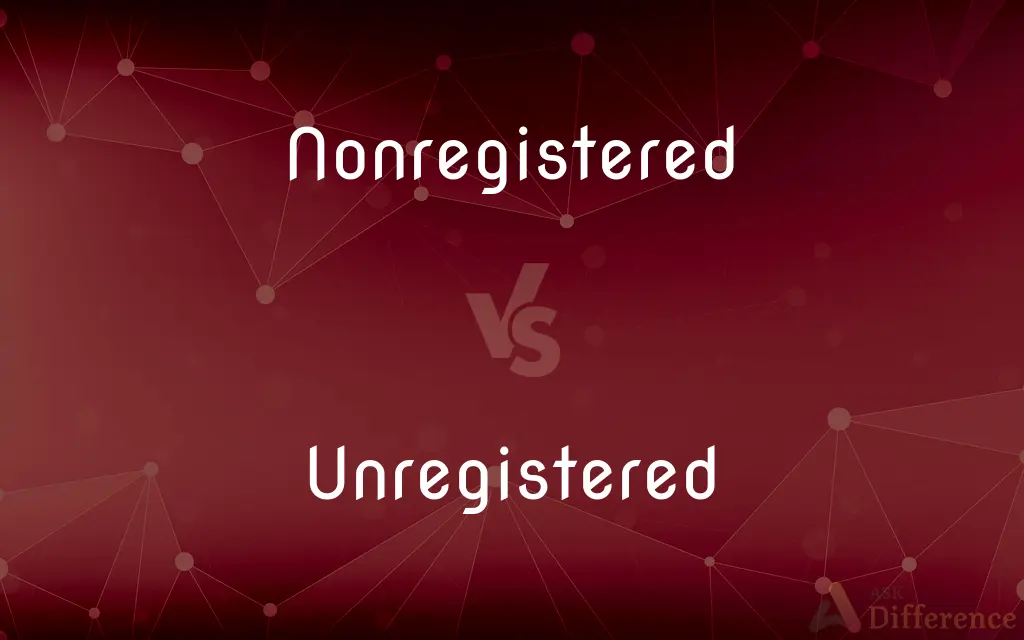Nonregistered vs. Unregistered — What's the Difference?
By Urooj Arif & Maham Liaqat — Updated on April 2, 2024
Nonregistered often implies not recorded in an official capacity, while unregistered suggests active avoidance or failure to register as required.

Difference Between Nonregistered and Unregistered
Table of Contents
ADVERTISEMENT
Key Differences
Nonregistered typically refers to entities or items that have not been recorded on official registers due to a lack of requirement or necessity. This term implies that there is no existing or anticipated need for such registration. On the other hand, unregistered usually indicates that something or someone should have been registered according to specific regulations or requirements but was not. This lack often implies a lapse or avoidance of formal or legal registration processes.
While nonregistered can apply to items, entities, or activities that fall outside the scope of what is normally recorded or tracked, unregistered explicitly points to a failure to comply with existing registration norms or laws. For example, nonregistered participants in a study might simply mean individuals not part of an official tracking or documentation process, whereas unregistered vehicles imply a legal oversight or neglect.
In certain contexts, nonregistered might be used to describe a status by default or choice, suggesting no regulatory framework exists or registration is voluntary and not pursued. In contrast, unregistered frequently carries a connotation of noncompliance or illegality, indicating that the registration should have been completed as per legal or formal requirements but was not.
The distinction also extends to the implications of each term; nonregistered entities may not face legal consequences or penalties because they operate in areas where registration is not mandated. Conversely, unregistered entities or items often risk penalties, sanctions, or other legal repercussions due to their failure to register in accordance with specific regulations or laws.
Despite these differences, both terms highlight the importance of understanding the context in which registration is discussed, including the legal, regulatory, and procedural frameworks that determine the necessity and implications of being registered or not.
ADVERTISEMENT
Comparison Chart
Implication
Lack of requirement or necessity for registration.
Failure to fulfill a required registration process.
Connotation
Neutral, indicating no existing framework or need.
Negative, suggesting noncompliance or illegality.
Common Uses
Items or activities not covered by registration laws.
Entities or items that neglect or avoid required registration.
Legal Implications
Typically none, as registration is not mandated.
Potential for penalties or legal issues due to noncompliance.
Context
Often voluntary or outside the scope of regulation.
Required by law or regulation, with oversight or neglect evident.
Compare with Definitions
Nonregistered
Not listed or recorded on an official register, often due to lack of requirement.
Nonregistered attendees at the conference could access only the public sessions.
Unregistered
Not having been registered as required by law or regulation.
Unregistered vehicles are subject to fines and penalties if caught on public roads.
Nonregistered
Indicates a neutral or default position without implying noncompliance.
Nonregistered software does not necessarily mean it is illegally used; it may simply not require registration.
Unregistered
Indicates a failure to adhere to mandatory registration processes.
Unregistered businesses may face legal action for operating outside regulatory compliance.
Nonregistered
In contexts where registration is optional, nonregistered status is a choice.
The nonregistered community groups operate informally, without official recognition.
Unregistered
Pertains to items or entities that legally should be registered.
The law mandates that all pets be microchipped and registered; unregistered pets can result in fines for their owners.
Nonregistered
Applies to entities or activities beyond the reach of regulatory frameworks.
Nonregistered financial transactions fall outside the purview of regulatory oversight.
Unregistered
Often implies deliberate avoidance or accidental oversight of registration duties.
The contractor was fined for using unregistered subcontractors in the construction project.
Nonregistered
When there is no mandate for registration, entities remain nonregistered.
In some areas, small-scale vendors remain nonregistered due to the lack of local business registration requirements.
Unregistered
Carries the risk of legal or financial consequences due to noncompliance.
Operating an unregistered daycare facility can lead to significant legal repercussions.
Nonregistered
Not registered; unregistered.
Unregistered
Not registered.
Unregistered
Simple past tense and past participle of unregister
Unregistered
(of animals) not recorded with or certified by an official breed association;
Unregistered dairy cattle
Unregistered
Not registered;
An unregistered citizen
Unregistered
Not filed or recorded in the place prescribed by law;
An unregistered trademark
An unregistered mortgage
Unregistered
(a boat or vessel) not furnished with official documents
Common Curiosities
What is the difference between nonregistered and unregistered?
The key difference lies in the implication: nonregistered often indicates no necessity for registration, while unregistered suggests a failure to comply with required registration processes.
What are the consequences of being unregistered?
Consequences can include legal penalties, fines, or other sanctions due to noncompliance with registration requirements.
What does nonregistered mean?
Nonregistered refers to entities or items not recorded on an official register, often because no registration requirement exists.
Why would an entity choose to be or remain unregistered?
Reasons may include an attempt to evade regulations, oversight due to complexity or cost of registration, or lack of awareness about registration requirements.
Can a business be legally nonregistered?
Yes, if the business operates in a context where registration is not required by law or regulation, it can be considered legally nonregistered.
Is it possible to move from unregistered to registered status?
Yes, by completing the necessary registration processes and complying with relevant laws and regulations, an entity can change from unregistered to registered status.
Can someone be penalized for being nonregistered?
Generally, no penalties are associated with being nonregistered if there is no legal requirement for registration in the first place.
How do regulatory bodies view unregistered entities?
Regulatory bodies often view unregistered entities negatively, as their status implies noncompliance with legal or formal requirements.
Are there benefits to registering if you are nonregistered?
Registering can provide legal protections, formal recognition, and access to resources or benefits not available to nonregistered entities.
What might lead an entity to remain nonregistered?
Factors can include the absence of a legal requirement, the desire for flexibility, or operating in a sector not covered by existing regulatory frameworks.
Share Your Discovery

Previous Comparison
Lignin vs. Chitin
Next Comparison
Maggie vs. MagpieAuthor Spotlight
Written by
Urooj ArifUrooj is a skilled content writer at Ask Difference, known for her exceptional ability to simplify complex topics into engaging and informative content. With a passion for research and a flair for clear, concise writing, she consistently delivers articles that resonate with our diverse audience.
Co-written by
Maham Liaqat













































